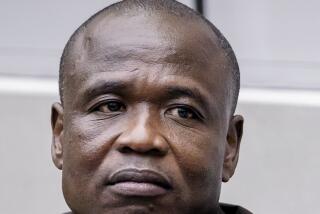Niger Delta inhabitants see compensation for executions as a new beginning
- Share via
JOHANNESBURG, SOUTH AFRICA — In Nigeria’s oil-rich Niger River Delta, where Royal Dutch Shell has a tense relationship with communities, activists Tuesday welcomed the company’s agreement to pay $15.5 million to settle a lawsuit that accused it of complicity in the 1995 executions of environmental and human rights advocates.
But the activists saw it as a starting point, not the end of the struggle of the Ogoni people and other communities in the region for compensation over Shell’s activities.
“One hopes that this is a signal of the beginning of a new phase that will address the larger issues of the Ogoni people, in a way that other people who are not benefiting from this can also get their benefit,” said Ledum Mitee, spokesman for the Movement for the Survival of the Ogoni People, or MOSOP, speaking by telephone.
“Both the government and Shell have to build on this and address the large issues not only for the Ogoni people but for the Niger Delta,” he said.
Ken Saro-Wiwa, poet, satirist and a founder of MOSOP, and eight other Nigerian activists in the delta region were hanged by the country’s military dictatorship. Saro-Wiwa had a central role in MOSOP’s 1990 bill of rights for the Ogoni people, which called for independence and the right to protect Ogoniland from environmental harm.
In a New York court Monday, Shell settled the case brought on behalf of six of the activists’ families, but conceded no blame for their deaths.
“We believe this settlement will assist the process of reconciliation and peace in Ogoniland, which is our primary concern,” Malcolm Brinded, Shell’s executive director for exploration and production, said in a statement released Monday. The settlement “acknowledges that, even though Shell had no part in the violence that took place, the plaintiffs and others have suffered.”
But Mitee said that was not how people in the Niger Delta saw the payment.
“They’re entitled to such views but as for people here, people take this as atonement for what has been done,” Mitee said. “The point is that any settlement for the benefit of any of the families that have been victims of the repression of the 1990s is welcome.”
Shell began operating in the Niger Delta in 1958 and is accused by local activists of destroying the environment and traditional livelihoods, such as fishing and farming. Critics also accuse the company of working with Nigerian authorities in the 1990s to suppress opposition to its activities, which Shell denies.
More than 30 million people and dozens of ethnic groups live in the three states of Nigeria’s delta area.
Since the 1990s, the Ogoni and others in the region have struggled for compensation for environmental damage and for a substantial share of the revenue generated by oil, including billions of dollars that activists say have been plundered or squandered by Nigerian officials over the years.
The situation has deteriorated sharply in recent years, with theft of oil and kidnapping of oil workers by militants claiming to represent the communities.
Thousands of people in Delta state have been displaced since mid-May by clashes between militants and the military. Since militants ambushed and killed soldiers with a joint military task force, charged with stabilizing the region, the force has attacked militants’ camps.
Mitee said activists in the region are still seeking environmental compensation. “That’s one of the main issues because that has an effect not only for the present but for future generations,” he said.
Mitee said a victory for the Ogoni people helped draw attention to issues affecting everyone in the region. “Any positive outcome that can be generated in one area will reverberate right across the Niger Delta,” he said.
About two-thirds of the settlement money will go to the families and for legal fees. The remaining $5 million will be put into a trust fund for local communities.
“The principle of saying we are going to establish a trust fund that reaches across the region sends a good message and is a good idea, even if the amount involved is not huge,” said Chris Newsom, spokesman for the London-based Stakeholder Democracy Network, a human rights group.
--
More to Read
Sign up for Essential California
The most important California stories and recommendations in your inbox every morning.
You may occasionally receive promotional content from the Los Angeles Times.










